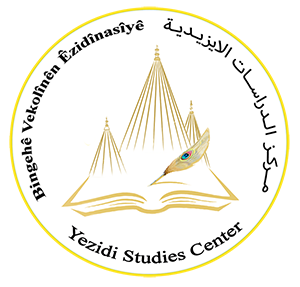a scholar belonging to the Yezidi religious minority. He has taught for several years at the University of Duhok in the Kurdistan Region, Iraq. Currently, he is working with Prof.Dr. Maisel on establishing Yezidi Studies as an academic discipline. Since the 1st of May 2022, he is working as a teacher for special tasks at the University of Leipzig, Oriental Institute in Germany. He is a researcher at the Center for Genocide Studies at the University of Duhok. He is a scientific researcher staff (wissenschaftlicher Mitarbeiter) at the University of LMU (Ludwig-Maximilians-Universität) Munich-Germany
Specialization
Modern History, Politics, and Minorities Issues particularly Yezidis in Iraq
Education
Since September 2021 doing a Habilitation project at the Oriental Institute of Leipzig University in Germany.
· 1999 - 2003: Duhok University/ College of Arts/ Department of History.
· 2005 - 2007: Master’s degree from History Department, Mosul University. The topic of the Thesis "Mawqif al-Kūrd min Ḥarb al-Istiqlāl at-Turkīyah 1919 - 1922 (The Position of Kurds Towards the Turkish Independence War 1919 - 1922)".
· 2013 - 2016: Promotion at the Goethe-Frankfurt University, Germany. The topic of the Dissertation "The People Who Struggle for Survival: Yezidis in Iraq: Between Citizenship and Policies of Marginalization (1958 – 2005)".
· March 2017 - July 2021: Post-Doctoral research at the Institute of Near and Middle Eastern Studies, Ludwig-Maximilians-Universität München. The research topic “Islamic State Genocide of Yezidis: The Present Face of Historical Islamic Invasions against Yezidis”.
Professional Career and Work Experience:
2004- 2017: Assistant Lecturer at University of Duhok, College of Arts, Department of History, in Kurdistan Region, Iraq.
· 2008 – 2009: Editor in Chief Dengê Lalish (newspaper), published from Cultural and Social Lalish Centre.
· 2010 - 2011: Editor in Chief of Lalish Media Network, www.lalishduhok.org.
· 2010 – 2011: Editing Secretary of Lalish (magazine), published from Cultural and Social Lalish Centre in Duhok.
· 2010 – 2013: A member of High Corporation of Yezidi Cultural and Social Lalish Centre in Duhok, Kurdistan Region – Iraq.
· 2017- 2021: Teacher at University of Duhok, College of Humanities, Department of History, in Kurdistan Region, Iraq.
· Since 01.08.2021: Research contractor with the University of Leipzig. I am also carrying out my habilitation project at the Oriental Institute since September 1st, 2021 where I am associated with Prof. Dr. Sebastian Maisel, professor for Arabic Linguistics and Translation and plan to submit my habilitation to the Faculty of History, Art and Regional Studies at the University of Leipzig in 2023.
Published Books
· (ed.), On Izidians and Lalish: An Introduction. Duhok 2009.
· (ed.), Dirāsāt fī tārīkh al-Kūrd al-Ēzidīyīn [Studies in the History of Yezidi Kurds]. Duhok 2009.
· (ed.), Maʾsāt al-Ēzidīyīn: al-Farmānāt wa-ḥamalāt al-ibādah ḍidda l-Kūrd al-Ēzidīyīn ʿibra t-tārīkh [The Yezidi Tragedy: The Campaigns Against the Yezidis Throughout History]. Duhok: Khani Press, 2009.
· Mawqif al-Kūrd min Ḥarb al-Istiqlāl at-Turkīyah 1919-1922 [The Position of Kurds Towards the Turkish Independence War 1919-1922]. Duhok: Spirez Press, 2008.
· Who Are the Yezidis? The History and Genocide of an Ancient People. Lewiston: Mellen, 2017.
· Yezidis in Iraq: Between Citizenship and Policies of Marginalization (1958-2005). Lewiston: Mellen Press, 2018.
· Islamic State Genocide of Yezidis: The Present Face of Historical Islamic Invasions against Yezidis. Institute of Near and Middle East Studies (in print)
Research Published in Local Magazines and Newspapers
· Erbil Citadel and its Ancient History, Khabat (2000, March 31)
· The Kurdish Issue in the Treaty of Sevres of 1920, Khabat 989 (2000, August 18).
· Comment on the Subject of Sheikh Adi bin Musafir, Lalish Voice, (2004, November 17).
· Yezidi as An ancient Religion, Lalish Voice (2004, October 11)
· The Yezidi Kurd in Kurdistan Region, Lalish Magazine (2005, April) 43-50.
· Kurdistan, The Home of Civilizations, Khabat (1999, April 9) 12.
· Ottoman Policy towards Yezidis during Half a Century, 1704-1752, Lalish 27 (2007) 88-96.
· The Positions of Great European Countries on the Kurdish Issue in the Framework of the Turkish Independence War, Lalish 28 ((2008) 23-65.
· The Yezidis and the Iraqi State from the Foundation until the Independence (1921-1932), Lalish 29 (July 2009) 24-42.
· The Yezidi Stance Towards the Armenian Massacres (1894-1918), Lalish 30 (2010) 3-21.
· Yezidi Situation, Lalish 31 (2010) 70-81.
Academic Conferences and Wordshop
- (October 9-10, 2015) The Yezidi 'Fermans' - Genocides Perpetrated by the Ottomans (16th Century to 1918) Sinjar Genocide is the Tragedy of the Twenty-First Century. International Conference held by the Centre for Yezidi Research, Academic Department of Yezidi Forum e.V., Oldenburg.
- ( January 19, 2024). Yezidi Periodicals (since the 1990s). Medienworkshop: Community Building across New Boundaries: Minorities and Diasporic Networks in Islamicate Print Culture. Munich. Retrieved from: https://www.naher-osten.uni-
muenchen.de/ wasistlosaminstitut/ veranstaltungsarchiv/ veranstaltungen_2024/mws24-01/ index.html - (May 29, 2024) Reevaluating Islamic Perspectives on Yezidis in Post-2014 Genocide: Historical Comparisons and Contemporary Initiatives for Coexistence. Third International Conference: Genocide and Peacebuilding at University of Sulaimani. Sulaimani, Iraqi-Kurdistan Region.
- (October 1- 5, 2024). Yezidi Studies at Leipzig University. Joint Workshop on Research and Teaching Interests in Arabic Language Education, organised by the Department of Arabic Studies at YSU, in collaboration with the Oriental Institute at the University of Leipzig. Yerevan State University in Armenia.
